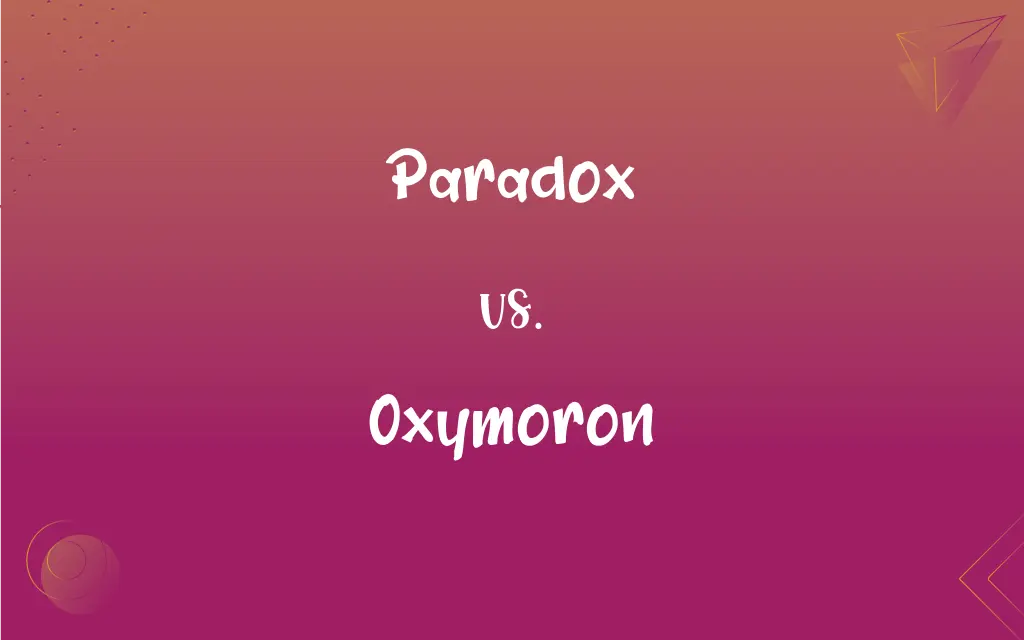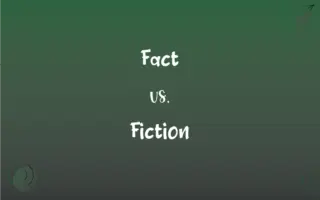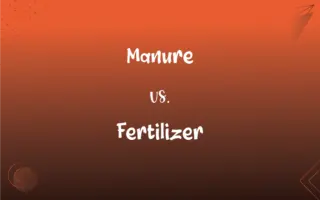Paradox vs. Oxymoron: What's the Difference?
Edited by Janet White || By Harlon Moss || Updated on October 22, 2023
A paradox is a statement that contradicts itself yet might be true, while an oxymoron pairs contradictory terms for effect.

Key Differences
Paradox and oxymoron are both rhetorical devices used in literature, speech, and everyday language, but they serve different purposes and are constructed differently. A paradox is a statement or proposition that, despite sounding contradictory or absurd, may in fact be true or make sense. It challenges the reader's or listener's preconceived notions and provokes thought. For instance, "less is more" suggests that restraint can lead to better outcomes, even if it sounds contradictory initially.
On the other hand, an oxymoron is a combination of two opposing or contradictory words used together for emphasis or dramatic effect. Examples like "jumbo shrimp" or "deafening silence" highlight the contrast between the words, creating an interesting juxtaposition that grabs attention. The juxtaposition in an oxymoron is more immediate, with the contradictory terms placed side by side.
While a paradox usually presents a larger idea or concept that requires contemplation to understand its deeper meaning, an oxymoron focuses on the immediate shock or surprise of the juxtaposed terms. Furthermore, paradoxes can be longer and may be presented in full sentences or even multiple sentences. Oxymorons, in contrast, are typically brief and consist of just two words.
The use of a paradox often invites deeper analysis and reflection. For instance, the statement "the only constant is change" encourages one to ponder the nature of life and the inevitability of change. An oxymoron, such as "cruel kindness," instantly conveys the complexity of a situation or emotion without requiring extended contemplation.
Comparison Chart
Definition
A seemingly contradictory statement that may be true
A combination of contradictory terms
ADVERTISEMENT
Length
Can be a full sentence or longer
Typically just two words
Purpose
To provoke thought and challenge perceptions
To create dramatic effect through juxtaposition
Examples
"Less is more"
"Jumbo shrimp"
Usage
Presents a larger idea or concept
Focuses on immediate juxtaposition
Paradox and Oxymoron Definitions
Paradox
A statement that appears self-contradictory but may have underlying truth.
This is the beginning of the end.
ADVERTISEMENT
Oxymoron
A figure of speech where contradictory terms appear together.
Act naturally.
Paradox
A concept that contradicts itself but still holds a deeper meaning.
The only constant is change.
Oxymoron
A pairing of opposing words to convey a specific effect.
Deafening silence.
Paradox
A proposition that defies intuition but may still be valid.
The more you learn, the more you realize you don't know.
Oxymoron
A linguistic combination that highlights contrast.
Bitter sweet.
Paradox
An assertion that challenges conventional wisdom.
Failure is the key to success.
Oxymoron
A juxtaposition of conflicting terms for emphasis.
Original copy.
Paradox
An expression that seems illogical but offers insight upon reflection.
To save money, sometimes you have to spend it.
Oxymoron
Two contradictory words used in unison for poetic or rhetorical effect.
Living dead.
Paradox
A statement that seems to contradict itself but may nonetheless be true
The paradox that standing is more tiring than walking.
Oxymoron
A rhetorical figure in which incongruous or contradictory terms are combined, as in a deafening silence and a mournful optimist.
FAQs
Why are paradoxes used in literature?
Paradoxes are used to provoke thought, illustrate complex ideas, or highlight underlying truths.
What is a paradox?
A paradox is a statement or proposition that, despite sound reasoning, appears to be self-contradictory or logically absurd, yet might be true.
Can you provide an example of an oxymoron?
Certainly. "Deafening silence" is an example of an oxymoron.
Why are oxymorons used in literature and speech?
Oxymorons are used to express complex ideas, evoke emotion, or create emphasis by juxtaposing contrasting words.
Is "jumbo shrimp" an oxymoron?
Yes, because "jumbo" means large, while "shrimp" often refers to something small, making it a contradictory pairing.
Can an oxymoron be more than two words?
Typically, an oxymoron consists of two contradictory words, but contextually, a phrase can also function as an oxymoron if it presents contrasting ideas.
Can the use of paradox or oxymoron be considered a mistake?
Not if used intentionally. Both devices are legitimate forms of expression. However, if used incorrectly or without clear intent, they might confuse the audience.
Can you give an example of a paradox?
Yes, the statement "Less is more" is a paradox.
Is a paradox always true?
No, a paradox can be an apparent contradiction, but it can also point to a deeper truth.
How is a paradox different from a contradiction?
A contradiction presents opposing facts that cannot coexist, while a paradox appears contradictory but can reveal an underlying truth.
How do paradox and oxymoron differ?
While both present seemingly contradictory elements, a paradox is a statement or proposition, while an oxymoron is a combination of two contradictory words.
Can an oxymoron be a paradox?
Yes, if the combined effect of the oxymoronic terms results in a seemingly contradictory statement that holds deeper truth, it can also be a paradox.
Are all paradoxes oxymorons?
No, while some oxymorons can be paradoxical, not all paradoxes are oxymorons. Paradoxes can be full statements or propositions, not just word pairings.
Which literary device is more common?
Both are common in literature and other forms of expression. The frequency of their usage depends on the context and the author's intent.
Are there any famous writers known for using these devices?
Yes, many writers like Shakespeare, George Orwell, and Oscar Wilde have effectively used paradoxes and oxymorons in their works.
What is an oxymoron?
An oxymoron is a figure of speech in which two seemingly opposing or contradictory elements are combined to create a unique expression.
Is "bitter sweet" a paradox or an oxymoron?
"Bitter sweet" is an oxymoron because it juxtaposes two contrasting words.
Are these terms only used in literature?
No, while frequently found in literature, both paradoxes and oxymorons can be used in everyday speech, philosophy, science, and various other fields.
Do both paradox and oxymoron originate from Greek?
Yes, "paradox" comes from the Greek "paradoxos" meaning "contrary to expectation," and "oxymoron" is derived from Greek "oxus" meaning "sharp" and "moros" meaning "foolish."
Why study paradoxes and oxymorons?
Understanding these devices enhances one's appreciation of language, literature, and rhetoric. They challenge conventional thinking and add depth to expression.
About Author
Written by
Harlon MossHarlon is a seasoned quality moderator and accomplished content writer for Difference Wiki. An alumnus of the prestigious University of California, he earned his degree in Computer Science. Leveraging his academic background, Harlon brings a meticulous and informed perspective to his work, ensuring content accuracy and excellence.
Edited by
Janet WhiteJanet White has been an esteemed writer and blogger for Difference Wiki. Holding a Master's degree in Science and Medical Journalism from the prestigious Boston University, she has consistently demonstrated her expertise and passion for her field. When she's not immersed in her work, Janet relishes her time exercising, delving into a good book, and cherishing moments with friends and family.
































































